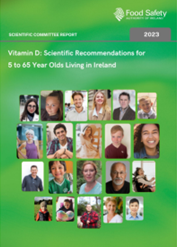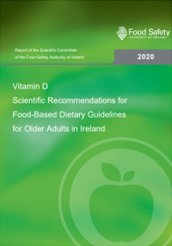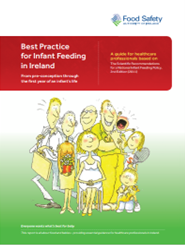Information about the need for extra Vitamin D in Ireland
Vitamin D is important for bone health, contributes to the normal function of the immune system and a healthy inflammatory response, as well as the maintenance of normal muscle function.
-
Why has vitamin D deficiency become a problem in Ireland?
Vitamin D deficiency was thought to have been eradicated in Ireland after the Second World War, due to better nutrition.
In the early 2000s, over 20 cases of rickets (a weakening of the bones caused by severe vitamin D deficiency) in infants and toddlers were reported in Ireland. Further research showed that low levels of vitamin D were widespread in the general population in Ireland.
The reasons for vitamin D deficiency in Ireland include:• Sunlight UVB radiation needed to make vitamin D is only available in Ireland during the months of April through October. This is due to our geographic location 52o - 55o North and means that Ireland experiences a ‘vitamin D winter’ that stretches from the end of October to late March.
In fact, studies in Ireland show that vitamin D status plummets over this wintertime period. So, if people have a blood test to assess their vitamin D status in March it will generally show a lower vitamin D status compared with having the same blood test in September.• Vitamin D is only naturally available in a few foods eaten in Ireland. Oily fish (salmon, mackerel, trout,) represent foods that are richest in vitamin D. While oily fish also provides other valuable nutrients, such as omega 3 fatty acids, recommended amounts of oily fish (once a week) will not provide enough vitamin D.
Other important food sources include the increasing number of vitamin D fortified foods (some milks, yogurts, breakfast cereals etc.). However, fortified foods tend to be more expensive and are not eaten by everyone so many people in Ireland do not get enough vitamin D in their diet.• Sunlight is the most important source of vitamin D in the world, but people must protect their skin from strong sunlight to prevent skin cancer. Although sunscreen products (with adequate SPF) also block the sun rays that make vitamin D in the skin (UVB radiation), studies show that inadvertent sun exposure makes an important contribution to vitamin D status. This inadvertent sun exposure occurs by just being out and about in sunshine while taking all precautions to avoid sun burn – that is wearing a hat, clothing to cover skin, using sunscreen and avoiding hottest times of the day etc.
It only takes minimal exposure to sunshine to make a big difference to a person’s vitamin D status. This also shows how people who never go outside are much more at risk of vitamin D deficiency.• People of dark-skinned ethnicity need longer sun exposure to obtain the same amount of vitamin D. This is because the skin pigmentation, melanin, absorbs the UVB rays that stimulate vitamin D synthesis. For these reasons people of dark-skinned ethnicity in Ireland are advised to take a vitamin D supplement all year round.
Briefly, inadvertent sun exposure in summertime will not be as effective in making vitamin D from UVB rays in people of dark-skinned ethnicity as it would be in people of fair-skinned ethnicity, who have lower amounts of melanin in their skin. -
What are the dietary sources of vitamin D?
Vitamin D is found naturally only in a small range of foods such as oily fish and egg yolks. The growing range of foods fortified with vitamin D include margarines and certain brands of ready-to-eat breakfast cereals, milks, yoghurts, and some processed cheese. Infant formula is unlike breast milk in that it has a lot of vitamin D added.
Offal meats, such as liver and kidney, are a good source of vitamin D but are not suitable for infants and pregnant women because they provide too much vitamin A.Dietary Source
Quantity
Vitamin D (µg)
Natural food
Salmon (canned in brine)
100 g (palm of hand size)
13.6
Mackerel (grilled)
100 g (palm of hand size)
8.0
Sardines (canned in oil)
100 g (palm of hand size)
3.6
Tuna (canned in brine)
100 g (palm of hand size)
1.1
Liver (lamb)*
100 g (palm of hand size)
0.9
Kidney (lamb)*
100 g (palm of hand size)
0.6
Egg (boiled)
2 eggs
3.2
Vitamin D fortified foods**
Milk with added vitamin D
200 ml (a glass)
2.0-4.0
Yoghurt with added vitamin D
125 g (a pot)
0.8-5.0
Dairy/non-dairy spreads with added vitamin D
10 g
0.5-0.8
Breakfast cereal with added vitamin D
30-40 g (a bowl)
0.8-3.4
Bread with added vitamin D
2 slices
0.6-1.4
Infant and young child foods
Infant Formula
100 ml
1.7
Follow-on Formula
100 ml
1.7
* These foods are not suitable for infants and pregnant women because they provide too much Vitamin A.
** The vitamin D content of fortified foods reflect the vitamin D levels in October 2023. Food products are voluntarily fortified with vitamin D by the food industry. Nutrition labelling must be checked, as the types of foods fortified, and the amounts of vitamin D added to such foods, change continuously. -
Can I get sufficient vitamin D from my diet?
Foods naturally containing vitamin D are not commonly consumed by people living in Ireland. While the range of foods fortified with vitamin D has greatly increased, the levels of vitamin D added varies greatly and this is limited to certain brands. Such brands and products tend to be more expensive than their non-fortified, counterparts.
Overall, this means that food intakes do not provide enough vitamin D during the winter months, when vitamin D is not available from sunlight. -
Should everyone be taking a Vitamin D supplement?
Almost everyone, with the exception of infants (up to 1 year of age) who consume 300 ml or more of infant formula (this is because infant formula has a lot of vitamin D added). Studies in Ireland have shown that low vitamin D status and vitamin D deficiency are widespread among the population of Ireland.
Currently, 94 % of children, 94 % of teenagers and 90 % of adults on the island of Ireland have inadequate vitamin D intakes. Therefore, almost everybody in Ireland needs a supplement of vitamin D. The amount of vitamin D needed depends on several factors, including age, skin type and, in the case of women, pregnancy.Population Group
Vitamin D supplement per day
Additional information
Infants
0-12 months5 µg (200 IU)
For infants who are breastfed or have less than 300ml of infant formula a day need a supplement all year round.
* Parents/carers should be advised to consult their pharmacist for advice on the most suitable vitamin D3 supplement for their infant. The product should contain vitamin D3 only and be in a liquid form suitable for infants.Children
1-4 years5 µg (200 IU)
For healthy children of fair-skinned ethnicity, to be taken during the extended winter months (end of October to March).
For healthy children of darker skin ethnicity, the vitamin D supplement needs to be taken throughout the full year.
Children
5-11 years10 µg (400 IU)
For healthy children of fair-skinned ethnicity, to be taken during the extended winter months (end of October to March).
For healthy children of darker skin ethnicity, the vitamin D supplement needs to be taken throughout the full year.
Teenagers and Adults
12-65 years15 µg (600 IU)
For healthy teenagers and adults who get sunlight exposure during summer, of fair-skinned ethnicity, to be taken during the extended winter months (end of October to March).
For healthy teenagers and adults (aged 12-65 years) of darker-skinned ethnicity and for individuals of all ethnic groups who are pregnant, the vitamin D supplement needs to be taken throughout the full year.Older Adults
65 years and over15 µg (600 IU)
For all older adults living in Ireland, the vitamin D supplement needs to be taken all year round.
Issues of cost and acceptability of, and access and adherence to, supplementation must be addressed to achieve equitable benefit from vitamin D supplementation at population level.
-
What happens if you don’t get enough Vitamin D?
Vitamin D is vital for bone health due to its role in calcium regulation. At its most extreme, vitamin D deficiency manifests itself as rickets (weakening of the bones) in children and osteomalacia (softening of the bones) in adults. Less severe vitamin D deficiency contributes to osteoporosis (bones are weaker and more likely to break).
Although it has not been proven, several studies suggest vitamin D deficiency may also be linked to non-skeletal health conditions, such as cardiovascular diseases; diabetes; inflammatory disorders; some infectious diseases (including COVID-19) and immune disorders; certain cancers; and higher mortality rates.
Vitamin D deficiency is a problem across Europe as well as in Ireland. Studies in Ireland have shown vitamin D deficiency is common among children, teenagers, and adults – particularly pregnant women. This deficiency is more pronounced in the winter months. A recent study showed that the prevalence of vitamin D deficiency among adults of dark-skinned Irish ethnicity (e.g., Irish Asian) to be much higher (affecting 70 %) compared with those who are fair-skinned (affecting 12 %). -
Can people take too much Vitamin D?
Yes. The only way people can take too much is by exceeding the recommended dose of vitamin D supplements or by taking a very high dose vitamin D supplement. Taking too much vitamin D from supplements over a period of time can cause a build-up of calcium in the body (hypercalcaemia). This can weaken the bones and damage the kidneys and the heart.
Therefore, it is very important that people:
1. do not take supplements that contain excessively high amounts of vitamin D
2. do not take more than is stated on the label.
Maximum Safe Levels for people of different ages are given in the following table. This is derived from Upper Level (UL) of intake, which is the highest level of intake from all sources deemed safe. The UL will vary according to body size and, therefore, is much lower for infants and children compared with adults.Age Group*
Maximum Safe Level from food supplements
Upper Level (UL, that should never be exceeded)
4 to 10 years
10 µg (400 IU) recommended daily amount and 5 µg (200 IU) for 4 years old.
35 µg (1400 IU) ensures those with the highest intakes of vitamin D from food will have total intakes that are less than the UL (50 µg).
This also leaves a margin to account for the likelihood of increases in vitamin D fortified foods.
50 µg (2000 IU)
>11 years
15 µg (600 IU) recommended daily amount.
75 µg (3000 IU) ensures those with the highest intakes of vitamin D from food will have total intakes that are less than the UL (100 µg). This also leaves a margin to account for the likelihood of increases in vitamin D fortified foods.
100 µg (4000 IU)
*Maximum Safe Levels of vitamin D were not developed for infants (birth to age 1 year) and children aged 1 to 3 years.
The Scientific Committee of the FSAI recommended that Ireland adopt the EFSA ULs for vitamin D of 50 µg (2000 IU) daily for children (aged 1–10 years) and 100 µg (4000 IU) daily for adolescents/teenagers (aged 11–17 years) and adults (aged 18 years and older).In a subsequent report , the FSAI developed guidance for the food supplement industry on the Maximum Safe Levels for all vitamins and minerals in food supplement products that ensures even those in each age group who have the highest intakes from food, will have intakes less that the UL.
-
Is breastfeeding the best option for infant feeding?
Yes, breastfeeding is the very best way to feed your baby. Breast milk is the optimum food for infants from birth to six months. Infant formula is not the same as breast milk and has a lot of vitamin D added. Therefore, infants up to 1 year of age taking 300 ml or more of infant formula should not be given a vitamin D supplement as this would give them too much.
Breastfed babies taking no infant formula, or taking less than 300 ml, should be given a supplement in liquid form providing 5 µg of vitamin D a day. -
I am pregnant and taking a vitamin D supplement. Does this mean my baby will not need to take a supplement?
No. Although babies are dependent on their mother’s vitamin D status, they are born with only 50-60 % of their mother’s vitamin D store.
Babies who are breastfed and are taking no infant formula, or taking less than 300 ml, should be given a supplement in liquid form providing 5 µg of vitamin D a day. -
Further information
For more information, see our reports:



